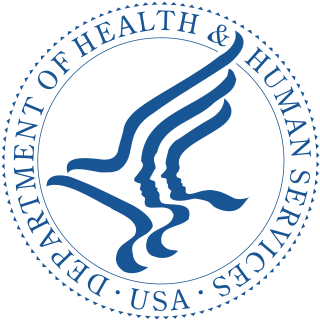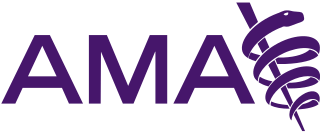Related Research Articles

The United States Department of Health and Human Services (HHS) is a cabinet-level executive branch department of the U.S. federal government created to protect the health of the U.S. people and providing essential human services. Its motto is "Improving the health, safety, and well-being of America". Before the separate federal Department of Education was created in 1979, it was called the Department of Health, Education, and Welfare (HEW).

The surgeon general of the United States is the operational head of the United States Public Health Service Commissioned Corps (PHSCC) and thus the leading spokesperson on matters of public health in the federal government of the United States. The Surgeon General's office and staff are known as the Office of the Surgeon General (OSG), which is housed within the Office of the Assistant Secretary for Health.
The Occupational Safety and Health Administration is a regulatory agency of the United States Department of Labor that originally had federal visitorial powers to inspect and examine workplaces. The United States Congress established the agency under the Occupational Safety and Health Act, which President Richard M. Nixon signed into law on December 29, 1970. OSHA's mission is to "assure safe and healthy working conditions for working men and women by setting and enforcing standards and by providing training, outreach, education, and assistance." The agency is also charged with enforcing a variety of whistleblower statutes and regulations. OSHA's workplace safety inspections have been shown to reduce injury rates and injury costs without adverse effects on employment, sales, credit ratings, or firm survival.

The American Medical Association (AMA) is a professional association and lobbying group of physicians and medical students. Founded in 1847, it is headquartered in Chicago, Illinois. Membership was 271,660 in 2022.

The Health Insurance Portability and Accountability Act of 1996 is a United States Act of Congress enacted by the 104th United States Congress and signed into law by President Bill Clinton on August 21, 1996. It aimed to alter the transfer of healthcare information, stipulated the guidelines by which personally identifiable information maintained by the healthcare and healthcare insurance industries should be protected from fraud and theft, and addressed some limitations on healthcare insurance coverage. It generally prohibits healthcare providers and businesses called covered entities from disclosing protected information to anyone other than a patient and the patient's authorized representatives without their consent. The bill does not restrict patients from receiving information about themselves. Furthermore, it does not prohibit patients from voluntarily sharing their health information however they choose, nor does it require confidentiality where a patient discloses medical information to family members, friends or other individuals not employees of a covered entity.

A fire marshal, in the United States and Canada, is often a member of a state, provincial or territorial government, but may be part of a building department or a separate department altogether. Fire marshals' duties vary but usually include fire code enforcement or investigating fires for origin and cause. Fire marshals may be sworn law enforcement officers and are often experienced firefighters. In larger cities with substantially developed fire departments the local fire departments are sometimes delegated some of the duties of the fire marshal.
A Physician Assistant or Physician Associate (PA) is a type of healthcare professional. While these job titles are used internationally, there is significant variation in training and scope of practice from country to country, and sometimes between smaller jurisdictions such as states or provinces. Depending on location, PAs practice semi-autonomously under the supervision of a physician, or autonomously performing a subset of medical services classically provided by physicians.
In the United States, Office of Inspector General (OIG) is a generic term for the oversight division of a federal or state agency aimed at preventing inefficient or unlawful operations within their parent agency. Such offices are attached to many federal executive departments, independent federal agencies, as well as state and local governments. Each office includes an inspector general and employees charged with identifying, auditing, and investigating fraud, waste, abuse, embezzlement and mismanagement of any kind within the executive department.

The College of Physicians and Surgeons of Ontario (CPSO) is the regulatory college for medical doctors in Ontario, Canada.

The California Department of Consumer Affairs (DCA) is a department within the California Business, Consumer Services, and Housing Agency. DCA's stated mission is to serve the interests of California's consumers by ensuring a standard of professionalism in key industries and promoting informed consumer practices. The DCA provides the public with information on safe consumer practices, in an effort to protect the public from unscrupulous or unqualified people who promote deceptive products or services.
In the United States, Medicare fraud is the claiming of Medicare health care reimbursement to which the claimant is not entitled. There are many different types of Medicare fraud, all of which have the same goal: to collect money from the Medicare program illegitimately.
The ethics involved within pharmaceutical sales is built from the organizational ethics, which is a matter of system compliance, accountability and culture. Organizational ethics are used when developing the marketing and sales strategy to both the public and the healthcare profession of the strategy. Organizational ethics are best demonstrated through acts of fairness, compassion, integrity, honor, and responsibility.
Mark R. Geier is an American former physician and controversial professional witness who testified in more than 90 cases regarding allegations of injury or illness caused by vaccines. Since 2011, Geier's medical license has been suspended or revoked in every state in which he was licensed over concerns about his autism treatments and his misrepresentation of his credentials to the Maryland Board of Health, where he falsely claimed to be a board-certified geneticist and epidemiologist.
The Federation of State Medical Boards (FSMB) of the United States is a national non-profit organization that represents the 71 state medical and osteopathic boards of the United States and its territories and co-sponsors the United States Medical Licensing Examination. Medical boards license physicians, investigate complaints, discipline those who violate the law, conduct physician evaluations, and facilitate the rehabilitation of physicians where appropriate. The FSMB's mission calls for "continual improvement in the quality, safety and integrity of health care through the development and promotion of high standards for physician licensure and practice."

The Medical Board of California (MBC) is a state government agency which licenses and disciplines physicians, surgeons and certain allied healthcare professionals in California. The Board provides two principal types of services to consumers: (1) public-record information about California-licensed physicians, and (2) investigation of complaints against physicians.
The Michigan Department of Technology, Management, and Budget, formerly Michigan Department of Management and Budget, is a principal department of the government of Michigan responsible for various support functions within the government.

The Department of Defense Whistleblower Program in the United States is a whistleblower protection program within the U.S. Department of Defense (DoD) whereby DoD personnel are trained on whistleblower rights. The Inspector General's commitment fulfills, in part, the federal mandate to protect whistleblowers. It also administers the Defense Intelligence Community Whistleblower Protection Program (DICWP), as a sub-mission for the intelligence community. The Inspector General's Defense Criminal Investigative Service also conducts criminal investigations which rely, in part, on Qui Tam relators.
The 2010 Oklahoma political corruption investigation was a criminal investigation that focused on whether Oklahoma State Representative Randy Terrill (R-Moore), State Representative Mike Christian, and State Senator Debbe Leftwich engaged in political corruption involving the Office of the Oklahoma Chief Medical Examiner.

The Winkler County nurse whistleblower case was a series of legal proceedings in West Texas concerning the retaliation against two nurses who submitted an anonymous state medical board complaint against a physician in 2009. The case attracted national attention for its implications on whistleblowing by nurses.
Dan Markingson was a young man from St. Paul, Minnesota who committed suicide in an ethically controversial psychiatric research study at the University of Minnesota while under an involuntary commitment order. For nearly eleven years, University of Minnesota officials defended the conduct of its researchers, despite significant public criticism, numerous news reports, and pressure for an external investigation. In March 2015, however, an investigation by a state watchdog agency found a number of alarming ethical violations in the case, including serious conflicts of interest and financial incentives, poor oversight of the study, pressure on Markingson to join the study while he was in a highly vulnerable state, and a series of misleading public statements by university officials. Shortly afterward, the university suspended recruitment into psychiatric research studies. On April 9, 2015, Charles Schulz, MD, announced his resignation as Chair of the Department of Psychiatry.
References
- 1 2 "Board for Professional Medical Conduct 2008-2009 Annual Report". Nyhealth.gov. Retrieved 2012-09-04.
- ↑ "Frequently Asked Questions". Nyhealth.gov. Retrieved 2012-09-04.